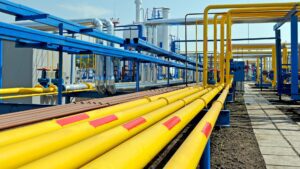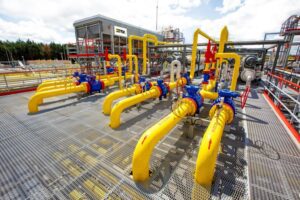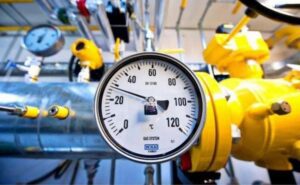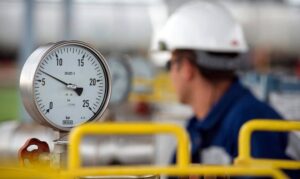
Ukraine may return to the idea of attracting European and American companies to manage its gas transmission system (GTS), Advisor to the Minister of Energy of Ukraine Lana Zerkal has said, expressing this opinion on the air of ICTV TV channel.
“This may be the same idea that was in 2019 for a joint consortium involving European and American companies to use the Ukrainian pipeline,” the ministry’s press service said, citing her.
According to Zerkal, this step will contribute to the lifting of Gazprom’s export monopoly on gas sales, since European consumers will have access to the GTS, deciding which gas supply route is more profitable for them.
“This is a geopolitical problem and it must be resolved at the geopolitical level using mechanisms inherent in geopolitics. Nord Stream 2 has become a stumbling block for the whole of Europe and for transatlantic relations. This is not only a question of Ukraine. This gas pipe has become an issue and a subject of international negotiations at the highest level,” Zerkal said.
She recalled that with the help of Ukraine’s partners in the European Union, it was already possible to amend the EU Third Gas Directive, which provides for its application to Nord Stream 2.
“It is very important that it be applied in full, because it will make it possible to balance market relations if Nord Stream 2 is nevertheless completed, certified and launched,” she said.
According to her, the EU has tools that can secure Ukraine from the use of Nord Stream 2 in full, leaving the Ukrainian GTS without transit.
“But for this we need to work with the European Commission, as well as with other countries that are also not interested in the launch of Nord Stream 2,” Zerkal said.

DTEK is considering the possibility of expanding its oil and gas business in Ukraine, CEO of the company Maksym Timchenko has said in an interview with the Ekonomichna Pravda edition.
“We are constantly studying the deposits of all available players on the market. That is, we are open to expanding our business, without exception, with all players, including state-owned companies. If there are such opportunities not only for acquisitions, but also for joint activities, some kind of joint projects in exploration and production, we are ready for this,” he said.
According to Timchenko, in particular, the assets of Geo Alliance group for DTEK are “a potential area of our interest.” At the same time, he did not comment on the details of the negotiations.
As reported, in 2020 DTEK Oil and Gas increased natural gas production by 10.8% (by 180 million cubic meters) compared to 2019, to 1.84 billion cubic meters. In 2021, the company plans to increase gas production to 2 billion cubic meters.
Geo Alliance produced 203 million cubic meters of gas in 2020.
Geo Alliance is under the mandate of the international investment and consulting group EastOne, which unites the assets of Victor Pinchuk. In 2012, EastOne announced a strategic partnership between Geo Alliance and Arawak Energy Ukraine BV, part of the Vitol group of companies, one of the largest operators in the world energy market.

The Slovak Republic has always been a reliable transit country for Russian gas to the West through Ukraine, and it is interested in maintaining this transit through Ukraine, said Prime Minister of Slovakia Eduard Heger.
“As for the Nord Stream 2 Project, it is not in the hands of Slovakia to decide. Slovakia has always been a reliable transit country for the Russian gas to the West through the territory of Ukraine and we are definitely interested in keeping this gas transit through Ukraine. We believe the transit contract between Russia and Ukraine will be fulfilled further on,” Heger said in an exclusive interview with Interfax-Ukraine.

Transit of natural gas through the gas transmission system (GTS) of Ukraine in January-April 2021 amounted to 14.1 billion cubic meters, which is 9% less than in the same period in 2020 (15.5 billion cubic meters), according to the statement of Gas Transmission System Operator of Ukraine LLC (GTSOU).
In particular, 12.5 billion cubic meters of gas were supplied in the western direction as transit (8.4 billion cubic meters to Slovakia, 2.9 billion cubic meters to Hungary, 1.2 billion cubic meters to Poland), 1.7 billion cubic meters to the south (1.3 billion cubic meters to Moldova, and 0.4 billion cubic meters to Romania).
According to Commercial Director of the operator Yevhen Todorov, GTSOU put up for auction for the distribution of additional capacities at interstate entry points from the Russian Federation for May 2021. However, market participants, in particular the Russian side, did not show interest in the proposal.
“Taking into account the seasonal market demand for gas in the EU and limited transportation volumes, starting from April 1, 2021, the price at gas hubs has shown an increase and from the beginning of the year to May 12, it has increased by 36%, to EUR 26.4 per MWh at the NCG hub on condition of delivery one day ahead (about EUR 279 per 1,000 cubic meters),” he said.
In addition, gas transportation from Europe to Ukraine in January-April 2021 amounted to 0.55 billion cubic meters, which is seven times less than in the same period in 2020 (3.87 billion cubic meters). Ukraine received 0.07 billion cubic meters of gas from NCG, 0.48 billion cubic meters from Hungary, while almost no gas was delivered to the country from Poland, Romania and Moldova.
Gas supplies as virtual reverse flow to Ukraine amounted to 0.49 billion cubic meters, or almost 90% of transportation. Gas flow in the “customs warehouse” mode amounted to 0.08 billion cubic meters versus 1.22 billion cubic meters in the same period in 2020.
Gas re-export from Ukraine in the four months ended April 2021 amounted to 0.68 billion cubic meters, while for the whole last year traders almost did not order re-export services.

Romania’s gas transmission system (GTS) operator SNTGN Transgaz has started selling capacity at the point of interstate connection with Ukraine Orlivka/Isaccea-1 on the RBP auction platform since April.
In this regard, the Gas Transmission System Operator of Ukraine (GTSOU) congratulated the Romanian colleagues in its message, expressing hope for the signing of interaction agreements at other points of connection between the countries.
“GTSOU constantly and systematically works with all its colleagues to ensure that such practices become a reality on each border with Ukraine and contribute to the further integration of Ukrainian and neighboring markets. We are glad that Romanian colleagues have now joined Poland and Hungary. This is another step towards easing the use of the Trans-Balkan Gas Corridor. We hope that our Slovak colleagues will support the trend of introducing auctions even before the end of 2021,” Director on Government and International Affairs Olha Bielkova said.
GTSOU said that the distribution of capacities at auctions is a transparent mechanism for the sale of services for the transportation of natural gas, in accordance with the Third EU Energy Package. From October 1, 2020, GTSOU, like all EU countries, distributes capacities to all points of interstate connection exclusively through auctions.